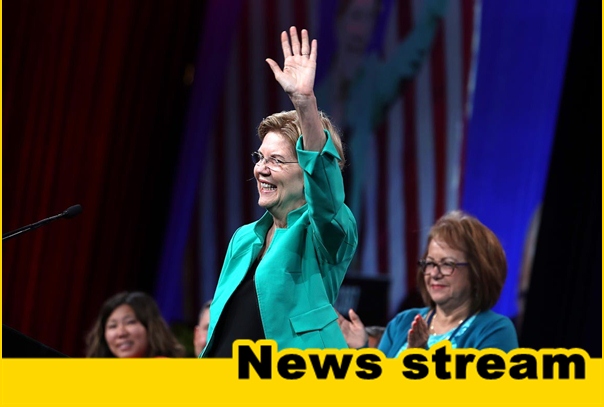
The Elizabeth Warren honeymoon may be coming to an end.
Warren’s weak fundraising and Native American controversy out of the gate gave her the look of a second-rate candidate, and her rivals have treated her as such, even as she’s rebounded from those early troubles.
But with the Massachusetts senator now drawing massive crowds and surging in national polls, competing campaigns are starting to refocus on Warren, looking to blunt her momentum.
Democrats are already opening up new lines of attack: calling her celebrated policy proposals a “fraud,” challenging her to say how she’d pay for a massive health care plan, highlighting a lack of diversity in her supporters and dropping reminders of Warren’s long span as a Republican.
Aides to three rival candidates confirmed in interviews they’re revving up opposition research on Warren in preparation for the next debate on Sept. 12. Still others privately complained she’s gotten fawning treatment in the media as she unveiled a litany of ambitious plans without being pressed on where the money would come from to pay for them.
Warren’s supporters said the gripes amount to sour grapes from campaigns who didn’t take her seriously until she shot up in the polls, and are now watching with envy the organization she’s amassed while they were busy attacking each other.
Either way, it appears Warren, who trails only Joe Biden in many polls, has a rougher stretch ahead of her.
“It’s inevitable: What goes up must come down. It’s the law of political physics,” Dick Harpootlian, one of Biden’s top South Carolina organizers, said of Warren’s turn in the hot seat.
Her opponents so far are treading carefully, wary of alienating Warren supporters whom they hope to win over eventually. Fellow liberal icon Bernie Sanders and Warren have long had a nonaggression pact, and various polls have shown overlap between backers of Kamala Harris and Warren. Biden, sitting atop the field, has been busy trying to deflect the brunt of attacks.
But surrogates for those top-tier candidates are starting to speak up.
The actress Susan Sarandon, while in Iowa supporting Sanders, threw shade at Warren last week. “[Sanders] is not someone who used to be Republican. He is not someone who used to take money, or still takes money, from Wall Street. He is the real deal,” she said.
An adviser to a competing campaign, who spoke on condition of anonymity, echoed some of that sentiment. If Warren attacks someone else’s record on the debate stage, the person said, she will get it back in return.
“Nobody else here has been a Republican before,” the adviser said.
Harpootlian, meanwhile, said a reckoning is coming on Warren’s menu of policy proposals.
“She’s promised about $50 trillion worth of benefits in the last 30 days. Her economics are fraud and at some point someone is going to point that out. She’s a multimillionaire professor at Harvard. She can’t rail against the 1 percent — she is one of the 1 percent,” Harpootlian said.
Warren has said the bulk of the funding for her plans — from promising to wipe out student loan debt to universal day care — would come from an „ultra-millionaire“ tax of 2 percent on family wealth of $50 million or more.
Some of the jabs starting to emerge are more subtle.
Jeff Weaver, a senior adviser to Sanders, needled Warren earlier this month over a lack of diversity among her supporters.
Comparing Sanders and Warren, Weaver said on HillTV, “His base is much more diverse, much more working class. Her base is much more college-educated, and so they are not really at this point competing for the same pool of voters.“
On social media this week, Bakari Sellers, Harris’ campaign co-chair in South Carolina, complained how the press handled a story about campaign workers who stayed at a Nevada hotel that was part of a labor dispute.
“This is a big story and an awful oversight by Warren & Biden, intentional or not,” he wrote. “We already know the headline would read ‘Harris crosses Culinary Union picket lines multiple times’ or ‘Harris accepts anti-union execs cash.’”
In an interview, Sellers complained that Harris has battled sexism, racism “and the Russians” while others in the race, including Warren, have had an easier ride, including on the debate stage.
“Elizabeth Warren has gotten a pass in both debates,” Sellers said. He said he believes Warren has run the best campaign of the 2020 race, but added: “I think that at the end of the day, the biggest criticism of Elizabeth Warren is her inability to make her plans actual reality. There are a lot of voters — especially black voters — who will say, ‘A lot of this is pie in the sky and we want pie on the table.’”
Democratic hopeful Michael Bennet, who serves with Warren in the Senate, lightly criticized her this week over her support for “Medicare for All.”
“We’ve already seen Sanders backtrack & it’s time Warren do the same & join fight for a public option,” Bennet tweeted.
It wasn’t exactly a bed of roses for Warren in the beginning. Before she even entered the race, she was dismissed as unable to connect with voters, a “Hillary 2.0” waiting to happen.
But she weathered those attacks, and strategic decisions by her campaign have helped make her an elusive target. She began addressing her biggest obstacle, her previous claims to Native American ancestry, in 2018 by releasing a DNA test before she announced for president. That allowed some of the hardest hits to unfold outside the presidential race.
Her decision to forgo big money fundraisers freed her up to bore in on her policy platform and political strategy. And generally, there’s less personal animosity between Warren and the other camps: Her staff, for example, has been careful not to get into spats on social media with aides to other candidates; those kinds of spectacles have ratcheted up tensions between other campaigns.
There’s another dynamic that’s insulated Warren so far. The other top-polling progressive in the field, Sanders, has adopted the position that there’s little to gain by attacking her. Sanders has repeatedly refused to go there.
Adam Green, co-founder of the Progressive Change Campaign Committee, which has endorsed Warren, said attacking Warren as a Republican — on the debate stage or otherwise — would only backfire.
“Ironically, if other Democrats point out that this economic populist hero who challenges corporations now also has the credibility of formerly being a Republican, that would only reinforce to voters that she’s more electable against Trump — that she can appeal to both the base and swing voters. That would be an absurd attack,” Green said. As for questions about her proposal to enact a wealth tax to help pay for a cadre of new programs, Green said: “Getting into a debate with Elizabeth Warren about plans? Probably not a good move — period.”
“I hit her really hard and it looked like she was down and out but that was too long ago, I should’ve waited. But don’t worry, we will revive it,” Trump said earlier this month.
Former Pennsylvania Gov. Ed Rendell, who is backing Biden, said Warren has avoided the kind of scrutiny that’s dogging Biden because she’s run a “mistake-free campaign” and has yet to be deemed a front-runner.
But Rendell said Warren won’t get a pass in the next presidential debate. He predicted, for one, that she’ll be pressed on how she would pay for Medicare for All.
“Elizabeth skillfully avoided answering the question: ‘Would your health care proposal cause taxes to rise?’” Rendell said. “She never answered the question … She’s done a great job avoiding it. She has to answer it now.”
Source: politico.com
See more here: news365.stream





